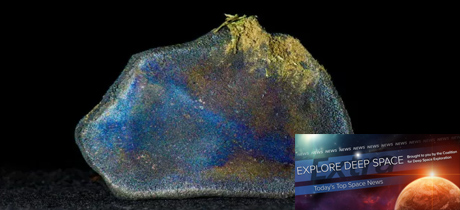In Today’s Deep Space Extra… Mission controllers continued their assessment of a small air pressure loss aboard the International Space Station (ISS) on Monday. Ground tests of the James Webb Space Telescope (JWST) on the way to a 2021 launch are successful. U.S. Justice Department charges NASA grant recipient and university research with hiding ties to Chinese government and industry.
Human Space Exploration
Crew spending another day in Russian segment
NASA (8/24): NASA on Monday extended by a day the stays of astronaut Chris Cassidy and cosmonauts Anatoly Ivanishin and Ivan Vagner in the Russian segment of the International Space Station (ISS) while ground control teams attempt to locate the source of a small air pressure leak within the Space Station first noted in September 2019. The trio entered the Station’s Russian Zvezda service module on Friday night as hatches between the Station’s various compartments were closed so pressures could be monitored over the weekend. “The leak is still within segment specifications and presents no immediate danger to the crew or the Space Station,” according to NASA.
Space Science
Ground segment testing a success for NASA’s James Webb Space Telescope
Coalition Member in the News – Northrop Grumman
NASA/Goddard Space Flight Center (8/34): Slated for launch on October 31, 2021, the NASA led James Webb Space Telescope (JWST) is undergoing pre-launch testing and integration at Northrop Grumman facilities in Redondo Beach, California. A recent Ground Segment Test verified the observatory is prepared to respond to commands once in space issued by its Mission Operations Center at the Space Telescope Science Institute (STScI) in Baltimore, Maryland. NASA and its European and Canadian space agency partners developed the observatory to learn more about the evolution of the early universe and assess the atmospheres of extrasolar planets for possible evidence of biomarkers.
Rainbow meteorite discovered in Costa Rica may hold building blocks of life
Space.com (8/24): Scientists are eagerly examining shards of a primitive carbon rich asteroid that fell over Costa Rica on April 23, 2019 and now called Aguas Zarca. They are hopeful the materials could provide new insights into the formation of amino acids into proteins, DNA and other building blocks of life. Terrestrial contamination may be an issue, but the find hints at what may be coming with the primitive materials returning to Earth aboard the Japanese and NASA asteroid sample return missions, Hayabusa 2 and Osiris Rex.
Did Jupiter push Venus into a runaway greenhouse?
Universe Today (8/23): Venus, Earth’s twin, may have supported liquid water on its surface as recently as a billion year ago. What turned it into a searing environment? According to modeling led by a researcher at the University of California, Riverside, it may have been a migration by the planet Jupiter from the inner solar system toward the outer solar system.
Op Eds
NASA’s Artemis Accords: the path to a united space law or a divided one?
The Space Review (8/24): In an op-ed, Dr. Guoyu Wang, Deputy Director of the China National Space Administration (CNSA) Space Law Center, examines the bilateral Artemis Accords proposal governing the extraction and use of space resources to further the human exploration of the Moon and other deep space destinations. NASA’s presentation of the Accords to the global community earlier this year sparked a discussion on how to proceed multinationally with future deep space exploration in a peaceful and risk constrained environment and avoid disputes over the discovery of possible valuable resources.
Other News
ULA to launch Delta 4 Heavy for its 12th mission, four more to go before rocket is retired
Coalition Member in the News – United Launch Alliance
SpaceNews.com (8/24): A classified National Reconnaissance Office payload is undergoing preparations for launch aboard a United Launch Alliance (ULA) Delta 4 Heavy from Cape Canaveral Air Force Station, Florida, on Thursday at 2:12 a.m., EDT, the first of five missions remaining for launch on the heavy lift rocket before it is retired. ULA is developing the Vulcan Centaur as a successor.
DOJ charges NASA researcher with failing to disclose China ties
The Hill (8/24): Texas A&M University professor and NASA researcher Zhengdong Cheng has been charged with accepting federal grant financing while hiding his ties to Chinese a government university and Chinese owned companies, according to the U.S. Justice Department. Arrested Sunday, Cheng faces charges of wire fraud, conspiracy and making false statements. He and his team were recipients of nearly $750,000 in grant monies for space research. “Once again, we have witnessed the criminal consequences that can arise from undisclosed participation in the Chinese government’s talent program,” Assistant Attorney General for National Security John Demers said in a statement.

